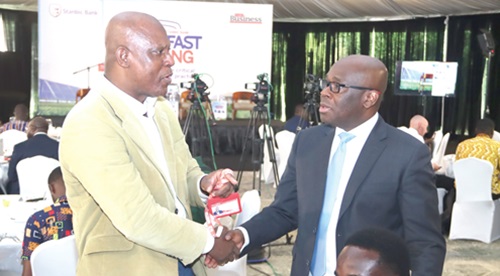The Chief Executive of Stanbic Bank Ghana, Kwamina Asomaning, has called for urgent and systemic reforms within Ghana’s agricultural value chain, describing the current food security situation as both an economic and sustainability crisis.
Speaking at the Graphic Business/Stanbic Bank Breakfast Meeting in Accra on Tuesday, Mr Asomaning highlighted the steep rise in food prices and their wider economic implications, urging key stakeholders to address the vulnerabilities undermining the country’s food system.
“Today’s theme, ‘The Future of Food: The Critical Place of Sustainable Practices’, is not just timely; it is essential, in alignment with the UN Sustainable Development Goal 2, which seeks to achieve zero hunger.
This is a call to action for all of us working across Ghana’s food ecosystem,” he said.
Mr Asomaning expressed concern over the escalating cost of food, identifying food inflation as the largest contributor to Ghana’s overall inflation.
“Let us be clear; the single biggest driver of Ghana’s overall inflation is food inflation,” he stated.
“As of March 2025, food inflation stands at 26.5 per cent. According to the World Bank’s February 2025 Food Security Update, Ghana had the highest food inflation rate among lower middle-income countries in Africa, reaching 27.8 per cent in December 2024,” he said.
He stressed that inflation had had real and painful effects on households, leading to dietary changes and rising malnutrition.
“Staple foods — (such as) maize, tomatoes, onions, gari — have more than doubled in price in recent years.
Families are adjusting, not just how they spend, but how they eat.
Protein is disappearing from dinner plates. Nutritional gaps are widening,” he added.
The Stanbic boss attributed much of the crisis to structural weaknesses in the agricultural value chain, including limited access to modern tools, poor financing options for smallholder farmers, low irrigation coverage, and inadequate post-harvest infrastructure.
“Over 80 per cent of our farmers are smallholders, many without access to modern tools or to financing.
Only three per cent of our cultivated land, and this is an estimate, is irrigable. Up to 30 per cent of our food is lost at harvest, food that could feed millions,” he pointed out.
Mr Asomaning warned that unless sustainable solutions were implemented, the economic consequences would deepen.
“High inflation continues to have damaging effects on Ghana’s economy.
It erodes purchasing power, reduces savings, creates business uncertainty and drives up interest rates,” he said.
“It also fuels currency depreciation, worsens income inequality and puts immense strain on public finances,” he added.
He proposed a rethink of the national approach to food production and distribution.
“Could improving rural storage and cold chain infrastructure help (to) reduce the billions we lose each year in post-harvest losses and lower prices for consumers?
Might scaling up irrigation protect farmers and markets from climate shocks?” he asked.
He also challenged the audience to consider how targeted financing, government policy, private investment, consumer behaviour and agri-tech could work together to create a more resilient food system.
“I certainly don’t claim to have all the answers,” he said, “but I believe that expertise and insight in this room can help us begin to chart a sustainable and inclusive path forward.”
The event, organised in partnership with Graphic Communications Group Ltd, brought together key figures in academia, finance, agriculture and technology.
It featured presentations from the Chair of the National Cyber Intelligent and Cyber Defence Research Project, Professor Kester Quist-Aphetsi; the Founder of Agrihouse Foundation, Alberta Nana Akyaa Akosa; and a financial risk manager and sustainability and climate risk professional, Professor Francis Atsu.
The breakfast meeting is part of a quarterly thought leadership series aimed at influencing policy and encouraging cross-sector collaboration to address Ghana’s most pressing economic challenges.
